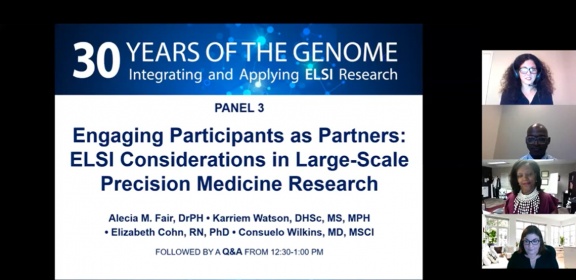NASHVILLE, Tenn. The efforts and accomplishments of the All of Us (AoU) Research Program Engagement Core took center stage on June 16, 2020, during a panel discussion entitled ”Engaging Participants as Partners: ELSI Considerations in Large-Scale Precision Medicine Research” for the Ethical, Legal and Social Implications (ELSI) Research Virtual Forum.
Each speaker – Alecia Fair, DrPH; Karriem Watson, DHSc, MS, MPH; and Elizabeth Cohn, RN, PhD – is a member of the AoU Engagement Core, and they discussed the importance of working with participants as partners throughout a research project.
Consuelo H. Wilkins, MD, MSCI, Executive Director for the Meharry-Vanderbilt Alliance (MVA) and Vice President for Health Equity at Vanderbilt University Medical Center (VUMC) moderated the discussion.
“Researchers often believe patient and community stakeholders need preparation to engage, not researchers,” Dr. Wilkins said. “Strategies are needed to enable co-learning, balance power and facilitate participant engagement.”
Participants as partners
“When we talk about the core values of the AoU Research Program, one that we emboldened through the Engagement Core was participants as partners,” Dr. Fair, who serves as Research Assistant Professor of Medicine at the MVA, explained. “Participants in a research study traditionally have a unidirectional relationship … but we decided, as a team, to do something more novel, something that has never been done before, and to set a precedent.”
That precedent completely changed the relationship between research participants and researchers. Gone was the unidirectional relationship, and in its place was a revolutionary dynamic that placed participants side-by-side with scientists to set the research project’s course and priorities.
In short, researchers and research participants were equals.
Diversity and trust
Dr. Watson, Associate Executive Director at Mile Square Health Center UI Health and Associate Director of Community Outreach and Engagement at UI Cancer Center at UIC, stressed the importance of diversity and trust for a project like AoU to succeed.
Diversity, he noted, had to go beyond traditional ideas like race or gender. AoU also considered geography, age, sexual orientation, gender minorities, diseases and more. “Where you live matters,” he said.
Likewise, the program couldn’t move forward without explicit trust between and among the participants and research/ers.
“There has to be a relationship built with community partners before you engage them,” Dr. Watson said. “There has to be trust built through relationship-building.”
Assessing the impact
Dr. Cohn, who is Professor of Community Health at Hunter-Bellevue School of Nursing, discussed the program’s impact thus far via surveys taken by AoU consortium members in 2019.
“The AoU Research Program has built a foundation of participant engagement and shared leadership, but there is more work to be done,” she said.
To accomplish that work, she recommended the following:
- Purposeful, intentional activities
- Supportive, active infrastructure
- Continued support and training of participant ambassadors and investigators
- Continuous assessment, evaluation and iteration
“AoU continues to support these principles, wrestling with the relevant issues daily to keep participants involved and active, paving the way for other large-scale trials to do the same,” Dr. Cohn commented.
Questions and answers
As the panel concluded, Dr. Wilkins opened the floor to questions and the panelists addressed queries about feedback, pushback and trust.
“The pushback was having participant partners and ambassadors invited to the ‘big table,’” Dr. Fair said. “When we first started this process, we all clustered at one table, and the next year, the participant ambassadors took the stage to share testimonials of why they joined the program.”
“We’re pretty early as a program,” Cohn added. “We’re building a platform, and researchers are just starting to come in.”
When the issue of trust arose, Dr. Wilkins asked, “Are we actually doing research that warrants trust? Are we presenting the opportunities to engage early enough that they should trust us with their time, their data, their blood, their DNA?”
Researchers, scientists and physicians, she believed, must accept and appreciate the importance of engagement to build that trust. It’s a skill that is, unfortunately, lacking in the medical community.
“Many researchers in AoU are not used to doing engagement,” Dr. Wilkins said. “It’s not something they’re trained in. I wasn’t trained in it. I had to be taught … I had to be taught by mentors and members of the community.”
About the Meharry-Vanderbilt Alliance
Founded in 1999, the Alliance bridges the institutions of Meharry Medical College and Vanderbilt University Medical Center. Its mission is to enrich learning and advance clinical research in three primary areas -- community engagement, interprofessional education and research -- by developing and supporting mutually beneficial partnerships between Meharry Medical College, Vanderbilt University Medical Center and the communities they serve. Through community engagement, the Alliance serves a large community of stakeholders including surrounding universities and colleges, community organizations, faith-based outlets and community health centers. Its interprofessional education enhances students' interdisciplinary understanding and improves patient outcomes through integrated care. The research conducted provides access to experienced grant writers and materials supporting the grant application process and facilitates grant-writing workshops.
